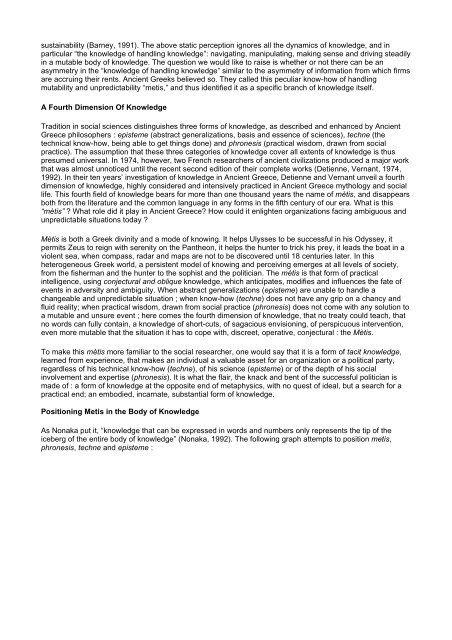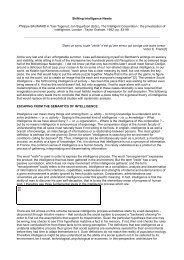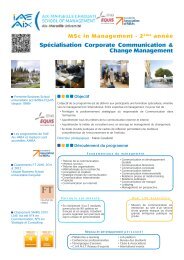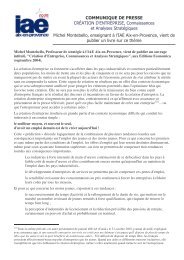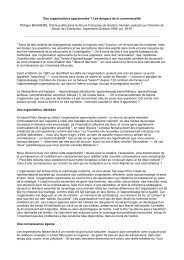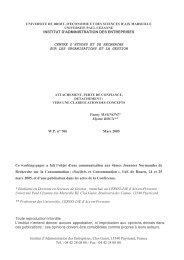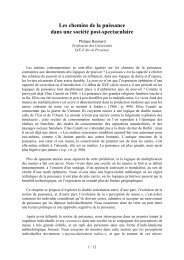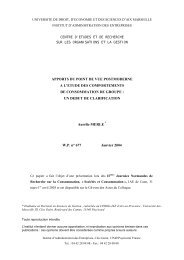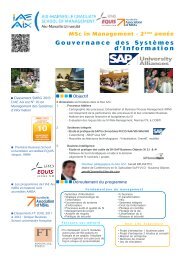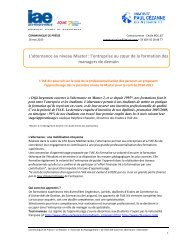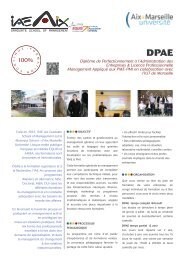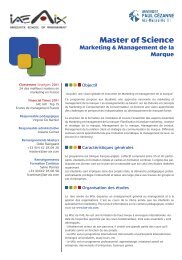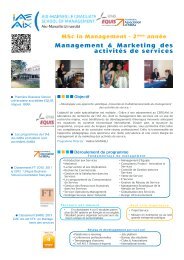Oblique Knowledge: The Clandestine Work of Organizations ...
Oblique Knowledge: The Clandestine Work of Organizations ...
Oblique Knowledge: The Clandestine Work of Organizations ...
Create successful ePaper yourself
Turn your PDF publications into a flip-book with our unique Google optimized e-Paper software.
sustainability (Barney, 1991). <strong>The</strong> above static perception ignores all the dynamics <strong>of</strong> knowledge, and in<br />
particular “the knowledge <strong>of</strong> handling knowledge”: navigating, manipulating, making sense and driving steadily<br />
in a mutable body <strong>of</strong> knowledge. <strong>The</strong> question we would like to raise is whether or not there can be an<br />
asymmetry in the “knowledge <strong>of</strong> handling knowledge” similar to the asymmetry <strong>of</strong> information from which firms<br />
are accruing their rents. Ancient Greeks believed so. <strong>The</strong>y called this peculiar know-how <strong>of</strong> handling<br />
mutability and unpredictability “metis,” and thus identified it as a specific branch <strong>of</strong> knowledge itself.<br />
A Fourth Dimension Of <strong>Knowledge</strong><br />
Tradition in social sciences distinguishes three forms <strong>of</strong> knowledge, as described and enhanced by Ancient<br />
Greece philosophers : episteme (abstract generalizations, basis and essence <strong>of</strong> sciences), techne (the<br />
technical know-how, being able to get things done) and phronesis (practical wisdom, drawn from social<br />
practice). <strong>The</strong> assumption that these three categories <strong>of</strong> knowledge cover all extents <strong>of</strong> knowledge is thus<br />
presumed universal. In 1974, however, two French researchers <strong>of</strong> ancient civilizations produced a major work<br />
that was almost unnoticed until the recent second edition <strong>of</strong> their complete works (Detienne, Vernant, 1974,<br />
1992). In their ten years’ investigation <strong>of</strong> knowledge in Ancient Greece, Detienne and Vernant unveil a fourth<br />
dimension <strong>of</strong> knowledge, highly considered and intensively practiced in Ancient Greece mythology and social<br />
life. This fourth field <strong>of</strong> knowledge bears for more than one thousand years the name <strong>of</strong> mètis, and disappears<br />
both from the literature and the common language in any forms in the fifth century <strong>of</strong> our era. What is this<br />
“mètis” ? What role did it play in Ancient Greece? How could it enlighten organizations facing ambiguous and<br />
unpredictable situations today ?<br />
Mètis is both a Greek divinity and a mode <strong>of</strong> knowing. It helps Ulysses to be successful in his Odyssey, it<br />
permits Zeus to reign with serenity on the Pantheon, it helps the hunter to trick his prey, it leads the boat in a<br />
violent sea, when compass, radar and maps are not to be discovered until 18 centuries later. In this<br />
heterogeneous Greek world, a persistent model <strong>of</strong> knowing and perceiving emerges at all levels <strong>of</strong> society,<br />
from the fisherman and the hunter to the sophist and the politician. <strong>The</strong> mètis is that form <strong>of</strong> practical<br />
intelligence, using conjectural and oblique knowledge, which anticipates, modifies and influences the fate <strong>of</strong><br />
events in adversity and ambiguity. When abstract generalizations (episteme) are unable to handle a<br />
changeable and unpredictable situation ; when know-how (techne) does not have any grip on a chancy and<br />
fluid reality; when practical wisdom, drawn from social practice (phronesis) does not come with any solution to<br />
a mutable and unsure event ; here comes the fourth dimension <strong>of</strong> knowledge, that no treaty could teach, that<br />
no words can fully contain, a knowledge <strong>of</strong> short-cuts, <strong>of</strong> sagacious envisioning, <strong>of</strong> perspicuous intervention,<br />
even more mutable that the situation it has to cope with, discreet, operative, conjectural : the Mètis.<br />
To make this mètis more familiar to the social researcher, one would say that it is a form <strong>of</strong> tacit knowledge,<br />
learned from experience, that makes an individual a valuable asset for an organization or a political party,<br />
regardless <strong>of</strong> his technical know-how (techne), <strong>of</strong> his science (episteme) or <strong>of</strong> the depth <strong>of</strong> his social<br />
involvement and expertise (phronesis). It is what the flair, the knack and bent <strong>of</strong> the successful politician is<br />
made <strong>of</strong> : a form <strong>of</strong> knowledge at the opposite end <strong>of</strong> metaphysics, with no quest <strong>of</strong> ideal, but a search for a<br />
practical end; an embodied, incarnate, substantial form <strong>of</strong> knowledge.<br />
Positioning Metis in the Body <strong>of</strong> <strong>Knowledge</strong><br />
As Nonaka put it, “knowledge that can be expressed in words and numbers only represents the tip <strong>of</strong> the<br />
iceberg <strong>of</strong> the entire body <strong>of</strong> knowledge” (Nonaka, 1992). <strong>The</strong> following graph attempts to position metis,<br />
phronesis, techne and episteme :


